Our indexes include entries for the spelling lord. In the period you have requested, we have the following 1,231 records (displaying 41 to 50):
Liegemen and traitors, diplomats and spies
(1540-1542)
The Privy Council of England dealt with many delicate and important matters of state. The surviving records date back as early as the 14th century, but Henry VIII on 10 August 1540, with the advice of the council, ordered that the council should have its own clerk 'to write, entre and registre all such decrees, determinacons, lettres and other such things as he shuld be appoynted to entre in a booke, to remayne alwayes as a leger, aswell for the dischardge of the sayd counsaillours touching such things as they shuld passe from tyme to tyme, as alsoo for a memoriall unto theim of their owne procedings'. The register from that date to 8 April 1542 was transcribed for the Commissioners of the Public Records by sir Harris Nicolas, and published in 1837. Although the council often dealt with petitions from aggrieved subjects, its main function was to oversee internal and external security. | Sample scan, click to enlarge
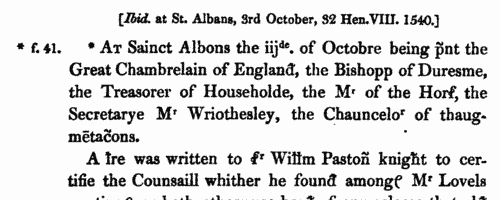
|
Liegemen and Traitors, Pirates and Spies
(1547-1550)
The Privy Council of Edward VI was responsible for internal security in England and Wales, and dealt with all manner of special and urgent matters
| Sample scan, click to enlarge

|
Ambassadors, ministers, soldiers and spies
(1547-1553)
The State Papers Foreign of king Edward VI consist mainly of letters and reports concerning England's relations with continental Europe, particularly the Netherlands and France. This calendar was edited by William B. Turnbull and published under the direction of the Master of the Rolls in 1861. The main text (to page 290) is abstracts of 710 letters from official correspondents abroad; but the remainder of the volume, entitled Calais Papers, deals with the English enclaves on the French coast. | Sample scan, click to enlarge
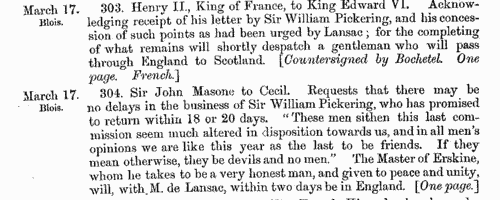
|
Inhabitants of Lancashire
(1547-1558)
Pleadings and depositions in the Duchy Court of Lancaster from the 1st year of Edward VI to the 5th and 6th of Philip and Mary were edited by lieutenant-colonel Henry Fishwick for the Lancashire and Cheshire Record Society and published in 1899. The records include some long and detailed depositions about the precise facts of the cases: whereas plaintiffs and defendants were by and large from the landed gentry, deponents were often of much humbler stations in life, people who otherwise hardly appear in surviving records. | Sample scan, click to enlarge
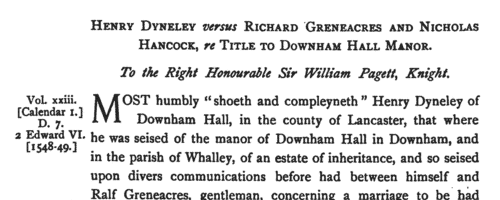
|
Inhabitants of Suffolk
(1568)
By Act of Parliament of December 1566 a subsidy of 8d in the £ on moveable goods and 4s in the £ on the annual value of land was raised from the lay (as opposed to clergy) population. These are the returns for Suffolk, printed in 1909 in the Suffolk Green Book series. | Sample scan, click to enlarge

|
London and Middlesex Feet of Fines
(1485-1569)
Pedes Finium - law suits, or pretended suits, putting on record the ownership of land in London and Middlesex. | Sample scan, click to enlarge

|
Liegemen and Traitors, Pirates and Spies
(1586-1587)
The Privy Council of queen Elizabeth was responsible for internal security in England and Wales, and dealt with all manner of special and urgent matters
| Sample scan, click to enlarge
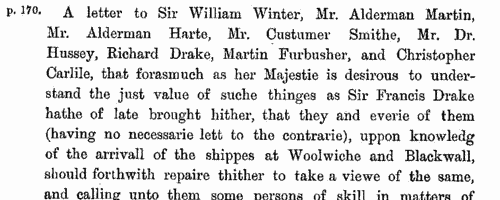
|
Liegemen and Traitors, Pirates and Spies
(1587-1588)
The Privy Council of queen Elizabeth was responsible for internal security in England and Wales, and dealt with all manner of special and urgent matters
| Sample scan, click to enlarge

|
Liegemen and Traitors, Pirates and Spies
(1590)
The Privy Council of queen Elizabeth was responsible for internal security in England and Wales, and dealt with all manner of special and urgent matters
| Sample scan, click to enlarge
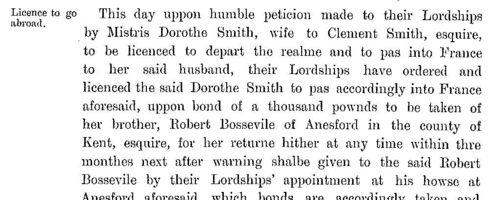
|
Liegemen and Traitors, Pirates and Spies
(1591)
The Privy Council of queen Elizabeth was responsible for internal security in England and Wales, and dealt with all manner of special and urgent matters
| Sample scan, click to enlarge
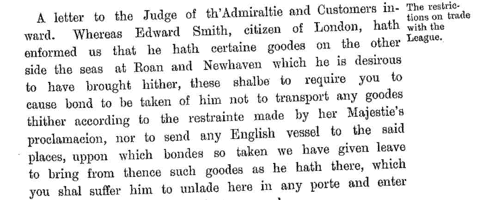
|
Research your ancestry, family history, genealogy and one-name study by direct access to original records and archives indexed by surname.











